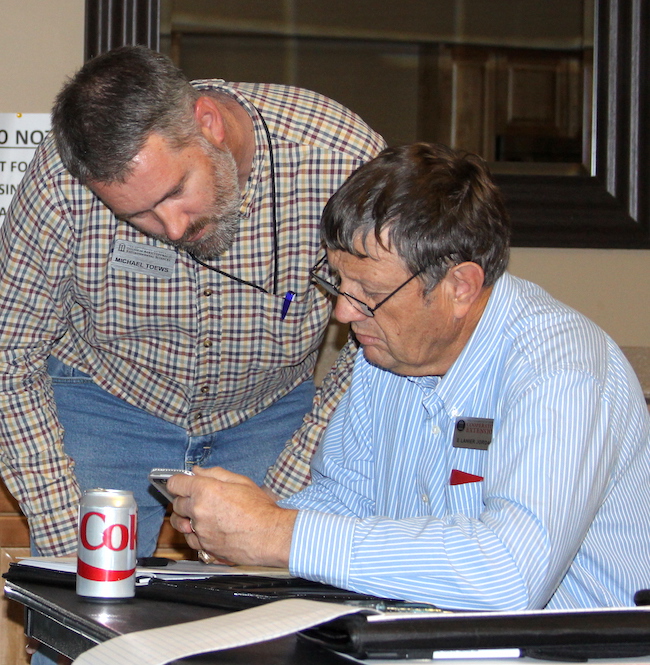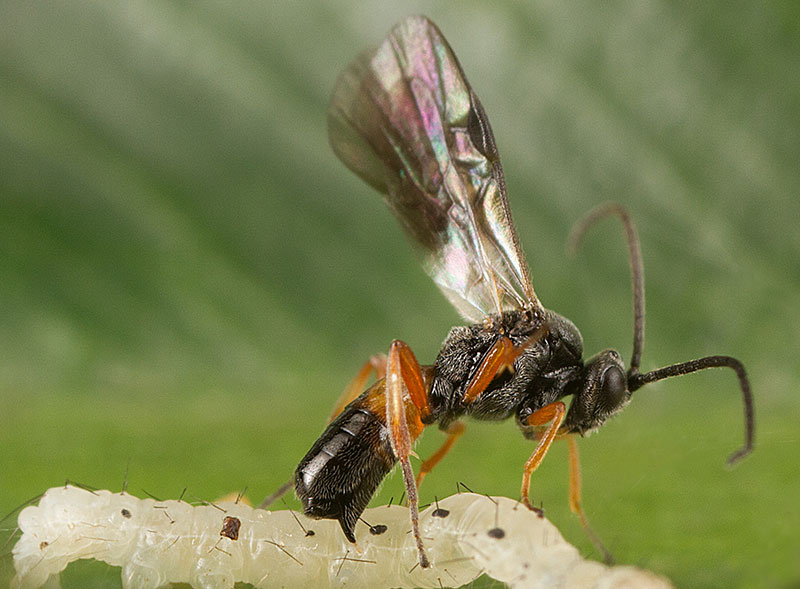Two days a week, University of Georgia researcher Michael Toews searches for and tests mobile apps on his smartphone and works on developing new mobile apps, all in an effort to help Georgia farmers manage their crops more efficiently.
Toews is a co-director at the UGA Center for Invasive Species and Ecosystem Health, or the Bugwood Network, located at the UGA campus in Tifton, Georgia. The center is staffed by faculty from the UGA College of Agricultural and Environmental Sciences and the Warnell School of Forestry and Natural Resources.
An entomologist with CAES, Toews’ research focuses on helping growers fight pests. Stink bugs, a major pest affecting cotton and other row crops, top his list, so much so that he developed EDDMapS IPM, the Early Detection and Distribution Mapping System for Integrated Pest Management app. The EDDMapS app, which is compatible with Apple and Android devices, allows scientists and farmers to track pests and make management decisions based on populations in fields and across landscapes.
“Anyone can identify a stink bug with assistance from pictures found in another app, called ‘SE Agricultural Stink Bug ID,’” Toews said. “We collected live bugs while doing field work for several years. Each bug was brought back to the laboratory live, where we could get them to lay eggs so we could take pictures of all the life stages for each species.”
The information from the tracking apps goes into the database and is uploaded to the EDDMapS app. Each data point is automatically stamped with the current time, date, latitude, and longitude and can be downloaded and sorted for further analysis, Toews said.
Toews shares his research with Georgia farmers and consultants through print and online publications, websites and workshops. He recently held a workshop specifically to share a host of mobile apps, created by UGA and other universities, with UGA Cooperative Extension county agents.
“This is the wave of the future. We have to harness technology,” said Toews, who uses a rugged smartphone that can stand up to agriculture work, like getting soaked by center pivot irrigation. “I tell everyone that the Georgia Pest Management Handbook is now available, but it’s not very practical to carry a 3-pound book to the field. (But when it's online) you can carry all that information on your phone.”
Most of the apps that Toews recommends ask the users a few questions before providing pest control recommendations from experts. Toews encouraged the Georgia county agents to sign up to receive notifications of growing pest populations or new pest sightings.
“My goal is to help the agents disseminate research information to growers as quickly and efficiently as possible,” he said.
With recent funding from the U.S. Department of Agriculture’s National Institute of Food and Agriculture, Toews is currently tracking three Georgia row crop pests: sugarcane aphid on grain sorghum and white mold and peanut rust on peanuts.
“Sugarcane aphid is a devastating invasive insect that migrates into Georgia each summer. It’s a new emerging pest,” he said. “Although the environmental conditions have to be favorable for a disease epidemic, the inoculum for white mold is present in every peanut field in Georgia; conversely, peanut rust is spread by spores that are dispersed in tropical storms over long distances, so we may or may not see that disease this year.”
Toews recommends the following agriculture-inspired mobile apps to Georgia farmers and other agriculture professionals.
Calibrate My Sprayer: Developed by Clemson University Extension, this app enables growers to properly calibrate any type of spraying equipment, including broadcast and banded applicators.
Early Detection and Distribution Mapping System: Developed by UGA’s Bugwood Network, this app provides a quick and accurate way to document invasive species in the field. It is fast, easy to use and doesn’t require geographic information systems, or GIS, experience.
GA Cotton Insect Advisor: Also developed by UGA’s Bugwood Network, this app is an expert system for determining Extension-prescribed insecticide treatments to manage cotton insect pests. Built-in functionality allows the app to include the correct threshold for a specific week of bloom and best recommendations to avoid a flare-up of secondary insect pests, like aphids and whiteflies.
Mix My Sprayer: Developed by Clemson University Extension, this app was created to help with quick, accurate calculation of product mixes that will be applied with spraying equipment.
MyIPM: Developed by Clemson University Extension and UGA Extension, this app provides IPM information to conventional and organic blueberry producers in the southeastern United States. Emphasis is placed on identification of insect pests, damage assessment, control and known insecticide resistance issues.
SE Agricultural Stink Bug ID: Developed by UGA’s Bugwood Network, this app helps farmers identify stink bugs and know which ones to control. “Not all stink bugs need to be treated and some species are resistant to commonly used insecticides,” Toews said.
SmartIrrigation Cotton: Developed by the University of Florida and UGA, this app uses meteorological data, soil parameters, crop growth stage, crop coefficients, rainfall and irrigation applications to estimate root zone soil water deficits.
VegDr: Georgia Vegetable Disease Guide: Developed by UGA’s Bugwood Network, this app helps growers identify and treat vegetable diseases of cucurbits, tomato and pepper through the use of colorful photos that show the typical symptoms of each disease.
Toews’ “big picture idea” is to be able to use mobile apps, and human scouts, to track everything from insects and diseases to flu epidemics.
For more information on EDDMapS apps, go to eddmaps.org. Mobile apps from Clemson University can be found at clemson.edu/extension/mobile-apps. Several irrigation apps developed by the University of Florida, UGA and the USDA can be downloaded at smartirrigationapps.org. A host of other apps can be found on UGA’s Bugwood Network at apps.bugwood.org/apps.








